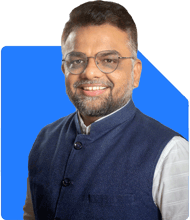I am 29. I am investing 10k in ICICI pru Flexi cap, 5k in Parag Parikh Flexi cap, 5k in Nippon India Small Cap, 5k in SBI Nifty Midcap 150 Index fund, 2.5k in Quant Midcap, 2.5k in Nippon Multi cap. Will this be good for a long term investment? Say around 20 years.
Ans: Evaluating Your Investment Portfolio for Long-Term Growth
Firstly, I appreciate your proactive approach towards investing at a young age. At 29, you have a significant time horizon to build a robust portfolio for long-term growth. Your current investments reflect a diversified approach, which is essential for managing risk and maximizing returns.
Let's dive into an in-depth evaluation of your investment choices and see how they align with your 20-year investment horizon.
Portfolio Breakdown
ICICI Prudential Flexi Cap Fund: Investing Rs 10,000 per month in this fund shows your inclination towards diversified equity exposure. Flexi cap funds are versatile as they invest across large-cap, mid-cap, and small-cap stocks, allowing the fund manager flexibility to capitalize on market opportunities.
Parag Parikh Flexi Cap Fund: Allocating Rs 5,000 per month here adds another layer of diversification. This fund is known for its prudent stock-picking and global exposure, which can hedge against domestic market volatility.
Nippon India Small Cap Fund: With Rs 5,000 per month in this fund, you are targeting high growth potential. Small cap funds can deliver significant returns over the long term, but they come with higher risk and volatility.
SBI Nifty Midcap 150 Index Fund: Investing Rs 5,000 per month in this index fund exposes you to the mid-cap segment. While index funds are generally low-cost, it's crucial to balance them with actively managed funds for optimized performance, especially over a long-term horizon.
Quant Midcap Fund: Allocating Rs 2,500 per month here focuses on the mid-cap segment, providing growth potential with manageable risk. Actively managed mid-cap funds can often outperform their index counterparts through strategic stock selection.
Nippon Multi Cap Fund: Investing Rs 2,500 per month in this fund adds further diversification. Multi-cap funds invest across all market capitalizations, balancing risk and return effectively.
Analytical Review of Your Investment Choices
Diversification: Your portfolio is well-diversified across different market capitalizations and fund types. This helps spread risk and captures growth from various segments of the market.
Flexi Cap Funds: Both ICICI Prudential Flexi Cap and Parag Parikh Flexi Cap funds offer broad diversification. They provide the fund manager with the flexibility to switch between different market caps based on market conditions.
Small and Mid Cap Exposure: Your investment in Nippon India Small Cap and Quant Midcap funds targets the potential for higher returns. However, small and mid-cap stocks can be volatile, so these should be monitored and balanced as needed.
Index Fund Exposure: While SBI Nifty Midcap 150 Index Fund provides exposure to mid-cap stocks, actively managed funds can offer better returns due to strategic management. Over 20 years, actively managed funds can adapt to market changes more effectively.
Benefits of Actively Managed Funds Over Index Funds
Active Management Advantage: Actively managed funds have the potential to outperform index funds through tactical asset allocation and stock selection. Fund managers leverage their expertise to identify undervalued stocks and market trends.
Flexibility: Unlike index funds, actively managed funds are not bound to a specific index. They can shift investments to better-performing sectors or stocks, potentially enhancing returns.
Risk Management: Actively managed funds can employ risk management strategies, such as adjusting sector allocations or increasing cash holdings during market downturns, to protect the portfolio.
Assessing Your Long-Term Investment Strategy
Compounding Effect: Investing consistently over 20 years will allow your investments to benefit from compounding. The longer you stay invested, the greater the compounding effect, leading to significant wealth accumulation.
Rebalancing: Regularly review and rebalance your portfolio to ensure it aligns with your risk tolerance and financial goals. Rebalancing helps maintain the desired asset allocation and mitigates risk.
Economic Cycles: Over 20 years, you will experience various economic cycles. Actively managed funds can adjust their strategies to navigate these cycles, potentially offering better risk-adjusted returns.
Optimizing Your Portfolio for Better Returns
Consider Large Cap Funds: Adding a large cap fund can provide stability to your portfolio. Large cap stocks are typically more stable and less volatile, offering steady growth over the long term.
Evaluate Fund Performance: Regularly assess the performance of your chosen funds. If any fund consistently underperforms its benchmark or peers, consider replacing it with a better-performing fund.
Tax Efficiency: Understand the tax implications of your investments. Long-term capital gains (LTCG) from equity funds are taxed at 10% on gains exceeding Rs 1 lakh in a financial year. Efficient tax planning can enhance your net returns.
Financial Planning and Retirement Goals
Setting Clear Goals: Define your financial goals clearly. Whether it's retirement, buying a house, or children's education, having specific goals will help tailor your investment strategy accordingly.
Emergency Fund: Maintain an emergency fund equivalent to at least six months of your expenses. This ensures you don’t have to dip into your investments during emergencies.
Insurance Coverage: Ensure you have adequate health and life insurance coverage. This protects your family and financial goals in case of unforeseen events.
Enhancing Financial Knowledge
Continuous Learning: Stay updated with financial news, investment trends, and market developments. Continuous learning helps make informed decisions and adapt to changing market conditions.
Consulting a Certified Financial Planner: For personalized advice, consider consulting a Certified Financial Planner (CFP). A CFP can provide a comprehensive financial plan tailored to your unique situation and goals.
Final Insights
Your commitment to investing Rs 30,000 monthly at such a young age is impressive. Diversifying your investments across flexi cap, small cap, mid cap, and multi cap funds shows a strategic approach. However, consider the advantages of actively managed funds over index funds for potentially higher returns and better risk management. Regularly review and rebalance your portfolio, stay informed about market trends, and consider professional financial advice to optimize your investment strategy for the long term.
Best Regards,
K. Ramalingam, MBA, CFP,
Chief Financial Planner,
www.holisticinvestment.in



























